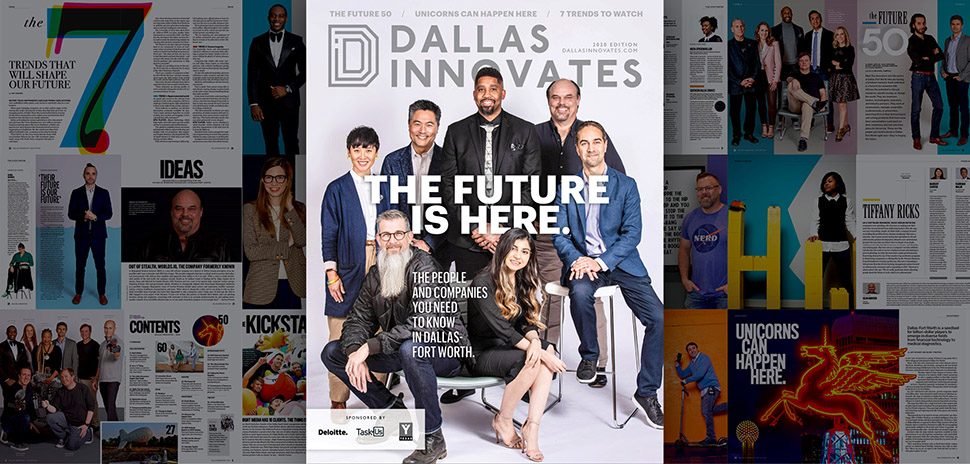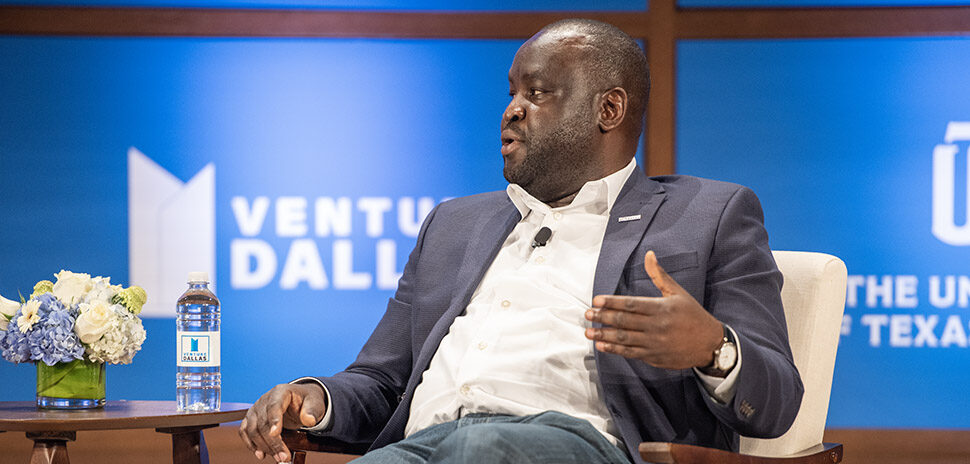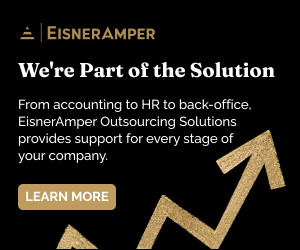As Annabel Reeves puts it, “we’re living in a very different world today than we were even a year ago between macro-economic uncertainties and rising interest rates.” And that’s changing the fundraising landscape for both entrepreneurs and investors.
“It’s a different world out there and quite challenging for those starting their companies,” Reeves added at Venture Dallas 2022, which took place recently at the George W. Bush Presidential Center.
Reeves, Venture Dallas chief of staff and private wealth advisor at Goldman Sachs, took the stage at the conference with a panel of investors focused on everything from crowdfunding and early-stage startups to businesses already generating more than $10 million in annual revenue. They discussed trends in the current market and shared insights to help those on both sides of the cap table.
Meet the panelists
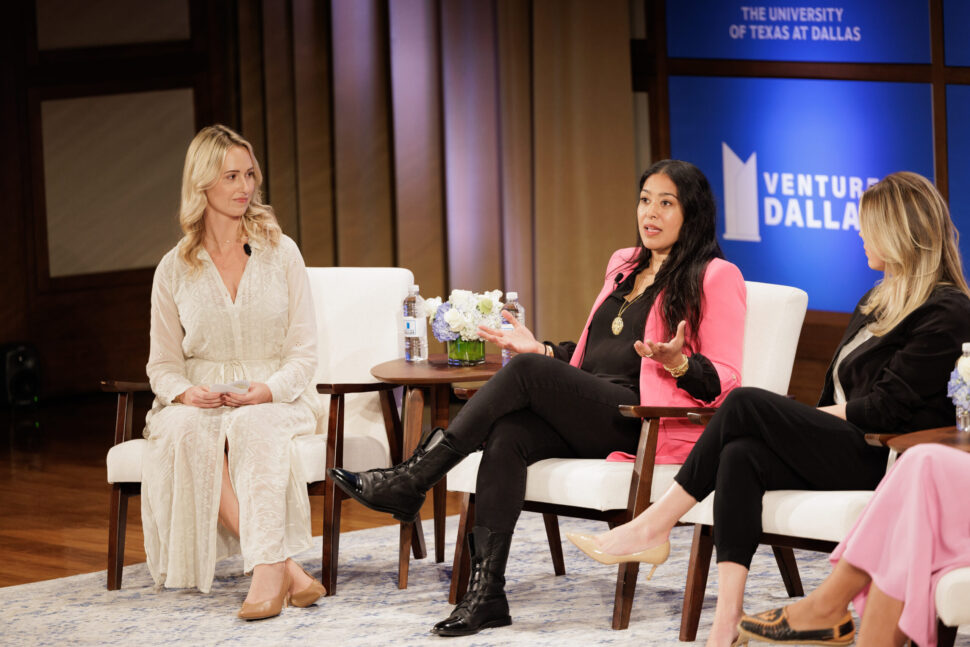
Left and center: Annabel Reeves and Pialy Aditya [Photo: Joseph Haubert/Venture Dallas]
The first of three panelists to field a question was Pialy Aditya, chief strategy officer at Republic. The New York-based crowdfunding platform offers opportunities for accredited and non-accredited investors to invest in growth-stage, pre-IPO startups. In late 2020, working with local partners like SMU, The DEC Network, Integrative Ventures, Capital Factory, and Worklodge, the firm launched Republic Dallas, creating a curated community focused on the North Texas ecosystem. As of January 2021, Republic says it has seen more than a million people invest a collective $500 million across 500 completed deals.
Next up was Allison Ball, investment partner at Hanover Technology Investment Management. Founded in 2013, the California-based venture capital firm focuses on pre-seed to Series A investments in areas like cloud computing, SaaS, cybersecurity, and energy transition. Prior to joining the firm, Dallas-based Ball was a leader at tech giants VSCO and Facebook (now Meta).
The third panelist, Sabrina Chaudhury, is vice president at Kayne Partners. The growth capital arm of Los Angeles’ Kayne Anderson Capital Advisors, Kayne Partners focuses on investing in B2B software and tech-enabled service businesses across a number of industries. Having invested in more than 40 portfolio companies, the firm says it targets North American lower-middle market businesses that have between $10 million and $75 million in revenue, along with 20% annual growth.
The funding landscape: Insights and takeaways

L to R: Pialy Aditya, Allison Ball, Sabrina Chaudhury. [Photo: Joseph Haubert/Venture Dallas]
Advice for fundraising founders:
“Do your research. I see people with a lot of unrealistic expectations around valuation—not because they’re dumb—but because they really haven’t gone out to see what comps in the market are getting. When you’re fundraising, you’re selling a financial product and you really need to be aware of the market that you’re selling into, and what the competitive landscape looks like. When we complete a raise …I want [the company] to have 18 to 24 months of runway. Two things: Down rounds are not the worst thing in the world. If you need to go and give your same investors a little bit better terms to get some cash in the bank, I think that’s okay. If it’s worth building, and you want to keep doing it, that’s the most important thing. The second thing is, really do pick your investors wisely. Think about whether these are the people that you’ll want when you have to make really hard decisions.” —Ball
“We’ve really seen companies through their ups and downs. One nugget to take away is the demarcation between high cash-burning, unprofitable technology businesses and profitable, more sustainable businesses. Those two types of companies are getting vastly different valuations. And the ones that have seen the most dislocation have been the ones that are burning more. Whereas enterprise-focused technology companies that were unprofitable used to trade at 17x, we’ve seen that correction down to 4x in revenue multiples. On the sustainable profitable side, we’ve seen those businesses previously trading at 15x come down to around 11x on average. The path to profitability is definitely something to keep in mind. Prepare today and bolster your defenses for what may come tomorrow. Run your business in a way that ensures that you’ll be in a strong cash position… Make the cuts today that you need to in order to not be on your back foot when you go back out to the markets.” —Chaudhury
“The good news is that there’s just a little compression in valuation in the early stages, but the bad news is that there’s a lot less investment volume happening. Uber, Airbnb, and Slack were all created during [the last recession]. So today, you’re going to see the next unicorns, the next decacorns being created. So, chill. Just breathe. It’s going to be okay. We’re focused on capital efficiency, because you don’t know how long it’s going to take for the next round of financing. Focus on your core product. Think about the adjacencies that maybe you don’t do yet.” —Aditya
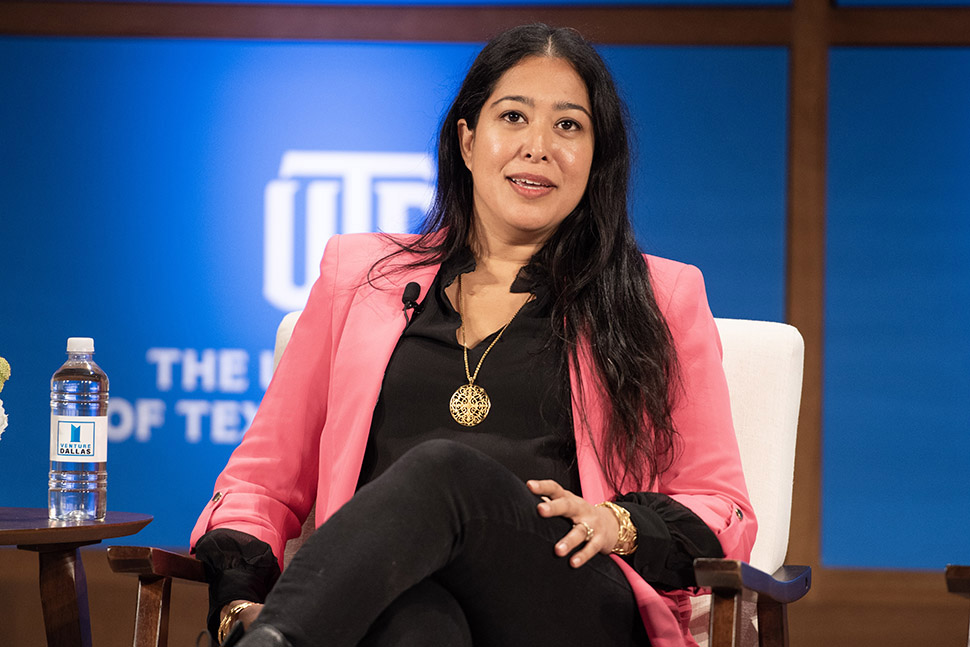
Pialy Aditya
What these investors look for in a startup:
“We look for product-market fit, some revenue, and we look for month-over-month growth in some fashion. That’s revenue, user growth, whatever that metric is. You pass that, you get to the diligence phase. In the diligence phase, we look at your data room, team, products, financials, we look at your cap table. If you have a term sheet, we’ll look at that.” —Aditya
“(In the early stages), we’re investing in people, it’s really that simple. Is this a person who can bring the idea that they have to market, build a company and a product around it, and grow that in an effective way? We really are looking for founders who have their eye on the prize. You also need to have the business acumen to understand what it’s going to take, in terms of funding, to get to your next milestone so that you’ll be able to raise, so that I’m not taking on financing risks.” —Ball
“The Rule of 40 is a metric for software companies. And it’s a metric that helps you balance your top-line growth and your profit margin. Basically, what it means is that if you add your revenue growth percentage plus your profit margin percentage, that should equal 40%. In the current environment, there’s been increased scrutiny on this metric. We’ve been in this crazy ‘Wild West’ of valuations, where people were purely focused on top-line growth at any cost. Now, there’s been an increased focus on that cost.” —Chaudhury
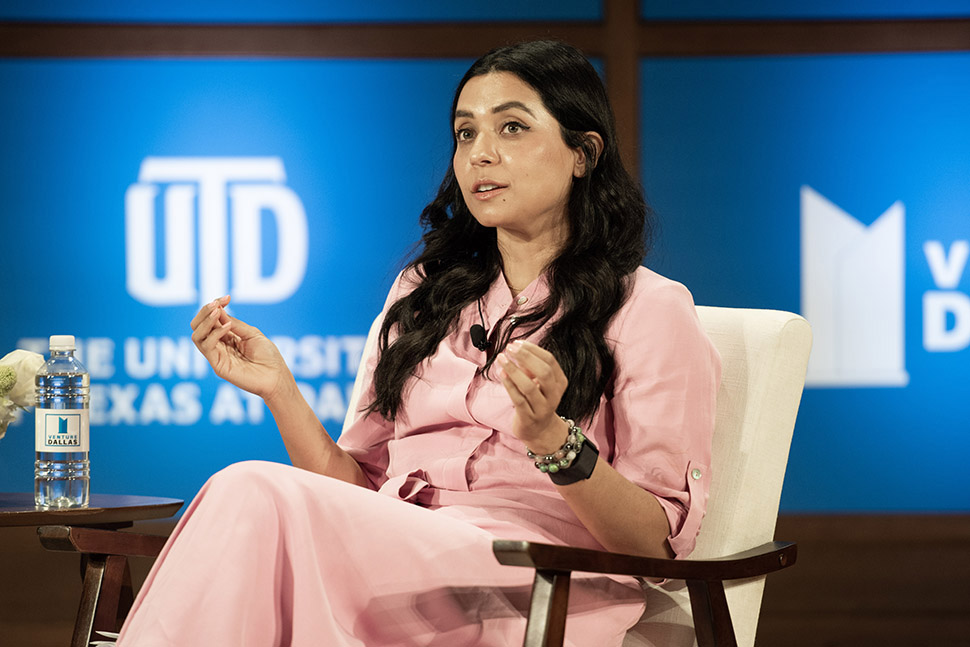
Sabrina Chaudhury
What makes the Dallas region exciting—and different from ‘the Bay Area, New York, and Boston’:
“We see Dallas as an up-and-coming market with a really strong entrepreneurial spirit. We have companies in other cities in Texas, like Austin and Houston. But we’re really looking to do more in Dallas. There’s a burgeoning ecosystem of corporations that are relocating here. We have 24 of Fortune 500 companies headquartered in the Dallas-Fort Worth area. I think up to 70 companies here have more than a billion dollars in revenue. These are companies that, as they’re looking to continue to define their competitive edge, they’re going to need technology to accelerate their revenue and to take out costs in their businesses. So we see that sort of symbiotic relationship really playing out over the next few years in terms of disruption and technological advancement.” —Chaudhury
“Dallas is full of great entrepreneurs in all different areas, and there are many great companies here. We’re seeing that it’s an important place to come and put a salesperson, put a second office. Dallas is going to be a critical place to come and develop your sales pipeline and market your product. The second thing that everyone should realize is very special about Dallas, is that it’s collaborative in a way that the Bay Area is not, that Boston is not, that New York is not. People really feel like they want to— especially these early stages—come together, build companies together, and partner together with entrepreneurs. The market is not so concentrated and crazy that you have to be quite as competitive [here}. And that’s something that we really need to use to our advantage. I’m hoping that we can really take this collaborative spirit and help use it to build the tech-founding culture here.” —Ball
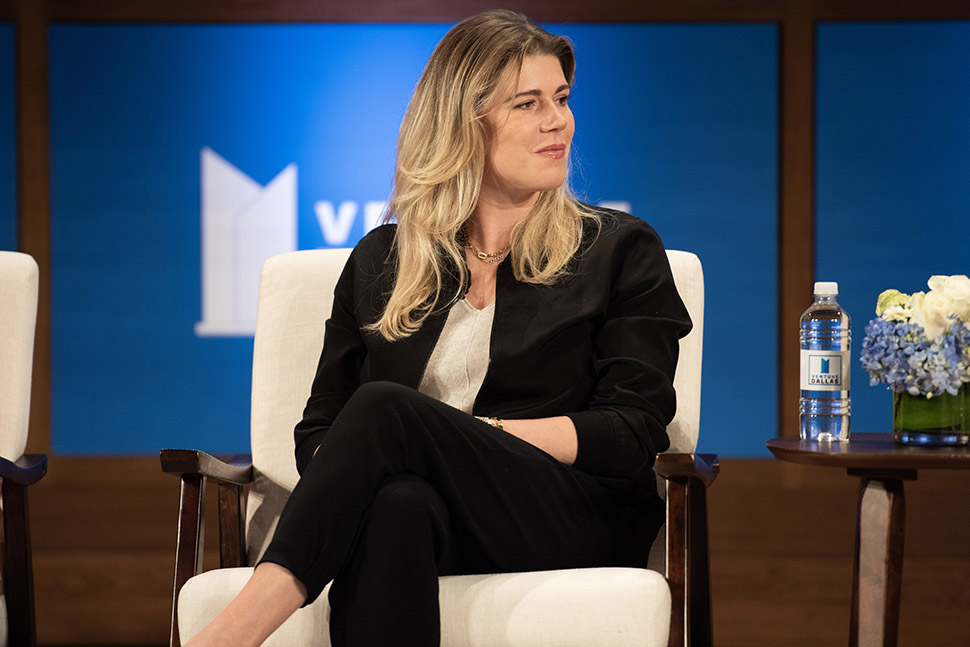
Allison Ball
On current investment trends—and why getting ‘back to basics’ in the contraction is a good thing:
“It’s important to focus on the retail investor, because if we do it right, we’re going to create more financial inclusion. There are startups here, who if you let the retail investor onto your cap table…you’re going to have the most fierce, loyal clients, customers, evangelists, because they’re investors in your platform. We will also see diversity in the founders that get funded. So you’ll see diversity in women, people of color, LGBTQ+ communities that are getting these investments. And when you do, you’re going to see diversity in innovation, the products, and markets that are going to come to bear. We’ll have financial inclusion, we will have wealth creation, and, hopefully, we’ll have generational wealth for people who are retail investors.” —Aditya
“There are a lot of tourists in venture right now. When it was easy to raise money, a lot of people went and got money to raise venture funds. And I have seen way too many companies that would have been awesome middle-market private equity or even big private equity investments go and raise venture because it was popular. I’m really excited for the contraction here to get us back to the basics of what venture investing really is and what it should be. And then, to help people look at other sources of funding that might be more aligned and appropriate to their business model.” —Ball
“We’re investing primarily in enterprise IT spend and we’ve seen a bit of a deceleration there. But for the sectors that are mission-critical solutions, there’s actually been an increase both in the number of deals and dollars deployed. Those sectors for us are healthcare, IT, cybersecurity, and supply chain and logistics—sectors that aren’t going away. Those are the things that we’re going to be thinking about for the next couple of years as we are waiting with bated breath to see what’s going on with the economy.” —Chaudhury
Final tips for founders—including what to take care of most:
“As an entrepreneur, just hustle. Don’t take ‘No’ for an answer. You’re going to get a lot of ‘No’s,’ so just keep at it.” —Aditya
“Choose your investors wisely. When things don’t go as planned—which they never really do—you want to be in bed with someone who’s going to help you get to where you need to be. That alignment is really important.” —Chaudhury
“Take care of yourself. Are you getting sleep? Are you eating? Are you getting nourished? If you need to exercise, make time to exercise. Take care of your families and do the things that keep you strong, because you’re not going to build a high-performing, excellent company if you’re not at your best. No matter how much I want to get a return for my investors, I don’t want to at the expense of a human being.” —Ball
Quincy Preston contributed to this report.
Note: Quotes have been edited for clarity and brevity. Dallas Innovates is a media partner of Venture Dallas.
![]()
Get on the list.
Dallas Innovates, every day.
Sign up to keep your eye on what’s new and next in Dallas-Fort Worth, every day.












